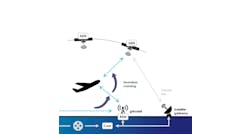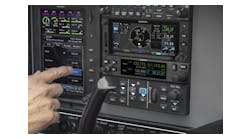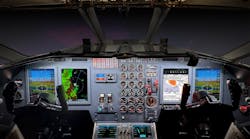July 07--A team from Boeing and Spirit AeroSystems continued to assess damage Monday to six Boeing 737 fuselages that were on a train that derailed on its way to Boeing's final assembly plant in Renton, Wash.
The fuselages were built in Wichita by Spirit AeroSystems.
The train, which was en route from Spirit, derailed Thursday in western Montana near the town of Rivulet. The derailment sent three 737 fuselages down a steep embankment on the Clark Fork River and knocked three others from the train.
Crews have been working to hoist the fuselages from the river, about 50 miles west of Missoula, but progress has been slow. One was removed Sunday, but Montana Rail link spokeswoman Lynda Frost said it could take until Tuesday to remove the remaining two.
Frost said each fuselage weighs about 20 tons and is attached to a 50-ton flatbed car.
The cause of Thursday's derailment, in which 19 cars left the track, is still under investigation. Frost said the train was traveling well under the 35 mph speed limit for that section of the track. No one was injured in the derailment.
Boeing, meanwhile, has not yet decided what it will do with the aircraft sections.
"Once we have completed our assessment of damages and determined our next course of action, we will decide what to do with the fuselages," Boeing spokesman Doug Alder said in a statement.
It's not yet known when the assessment of damage to the 737 fuselages might be completed, Alder said.
Some of the rail cars involved in the derailment were also carrying assemblies for Boeing 777 and 747 jetliners. Those assemblies have been inspected and appear undamaged, Alder said.
They will be shipped to Boeing's final assembly plant in Everett, Wash., and will arrive over the next several days, he said.
Spirit is working closely with Boeing, said Spirit spokesman Ken Evans, but Boeing is leading the effort.
"We will play a role in helping rectify the situation," Evans said. "We are confident that, working together, we will overcome whatever challenges may be presented."
Spirit has been shipping 42 Boeing 737 fuselages a month to Renton for final assembly into jetliners. But there is some buffer in the ramped-up production system that Boeing and Spirit have adopted to fill orders for planes, Evans said.
Spirit overcame a disruption to its production schedule after a tornado hit the plant in 2012.
"We made sure all hands were on deck, and we were fully focused on making up our internal schedule so we would not impact Boeing's delivery schedule," Evans said.
Within days after the tornado, Spirit resumed delivery to Boeing, and within weeks, the company was back on schedule.
"That would be our goal overall again," Evans said.
Because Boeing is still investigating, it hasn't announced what will happen with the fuselages involved in the derailment, he said. The fuselages become Boeing property as soon as they move outside the doors at the Spirit facility, Evans said.
The large blue-green fuselages are a familiar sight in Wichita as they head through town at the start of their 2,000-mile trip to Washington state. Spirit -- and Boeing Wichita before it -- has shipped 737 fuselages by rail to Renton for final assembly since the 737 program began in 1968.
One aerospace consultant said Monday that the derailment should make Boeing reconsider whether Spirit should be the sole supplier for 737 fuselages. While the disruptions may be short-lived, it's the second time in two years the 737 line has been disrupted in Wichita.
Although the 2012 tornado closed the plant for only a short time and damage was slight, "had the twister been more of a direct hit, the impact on Boeing would have been severe," wrote Scott Hamilton, an aviation consultant with Leeham Co. based in the Puget Sound area.
Boeing is planning to increase 737 production from 42 a month to 47 a month by 2018, and it's considering whether to raise rates to 52 or even 60 planes a month, Hamilton wrote in a newsletter.
"The company should consider creating a second fuselage production line -- and it should be right here in Puget Sound," he wrote.
He noted that the Puget Sound area is not without its own risk of natural disaster, with earthquake fault lines running through the area.
"From our perspective," Evans said, "there's a reason why Spirit is an important part of the Boeing supply chain, not only on 737 but on every Boeing commercial airplane flying."
Spirit is confident about its capability, capacity and track record, he said.
"We've been doing this for decades on the 737," Evans said. "We've been using the same delivery mechanism -- along with Boeing -- for that same amount of time."
___
Contributing: Associated Press
___
Reach Molly McMillin at 316-269-6708 or [email protected]. Follow her on Twitter: @mmcmillin.
Copyright 2014 - The Wichita Eagle



